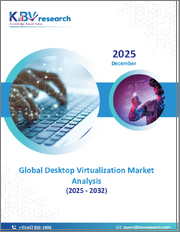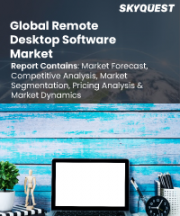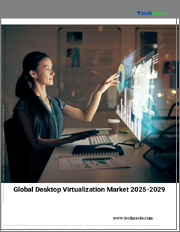
|
시장보고서
상품코드
1800850
데스크톱 가상화 시장 보고서 : 유형, 구성요소, 조직 규모, 업계별, 지역별(2025-2033년)Desktop Virtualization Market Report by Type (Virtual Desktop Infrastructure, Desktop-as-a-Service, Remote Desktop Services ), Component, Organization Size, Vertical, and Region 2025-2033 |
||||||
세계 데스크톱 가상화 시장 규모는 2024년 139억 달러에 달했습니다. 향후 IMARC Group은 2033년에는 298억 달러에 달할 것으로 예상하며, 2025-2033년 연평균 성장률(CAGR)은 8.38%에 달할 것으로 전망하고 있습니다.
데스크톱 가상화는 워크스테이션 환경을 시뮬레이션하고 로컬 또는 원격으로 연결된 장치를 사용하여 데스크톱 컴퓨터에 액세스하기 위해 구현되는 소프트웨어 기술을 말합니다. 일반적으로 VDI(Virtual Desktop Infrastructure), DaaS(Desktop-as-a-Service), RDS(Remote Desktop Services) 등의 애플리케이션을 포함합니다. 가상 데스크톱은 일반적으로 엔드포인트에 직접 설치되는 클라이언트 소프트웨어를 통해 액세스되며, 사용자는 로컬 마우스, 키보드, 터치스크린, 기타 주변기기를 통해 상호 작용하고 입력할 수 있습니다. 이를 통해 로컬 사용자의 전체 컴퓨팅 부하를 최소화하고, 수행되는 작업의 보안과 효율성을 모두 향상시킬 수 있습니다. 이 때문에 정보기술(IT), 통신, 교육, 은행, 금융서비스, 보험(BFSI), 헬스케어 등 다양한 산업에서 폭넓게 활용되고 있습니다.
시장 성장에 영향을 미치는 주요 요인 중 하나는 코로나 바이러스 감염증(COVID-19) 확산을 억제하기 위해 시행된 사회적 거리두기 조치로 인해 전 세계 조직에서 원격 근무에 대한 노력이 증가하고 있다는 점입니다. 이는 클라우드 컴퓨팅 시스템 구축의 증가와 함께 시장 전망을 밝게 하고 있습니다. 모바일 근로자가 증가함에 따라 기업들은 데스크톱 가상화 기술을 활용하여 어디서든 쉽게 오피스 애플리케이션과 데이터에 접근할 수 있는 환경을 구축하기 위해 데스크톱 가상화 기술을 활용하고 있습니다. 이를 통해 직원들이 지리적으로 접근하기 어려운 문제를 해결하여 직원들의 생산성을 향상시키고, 조직의 효과적인 의사결정에 도움을 주고 있습니다. 또한, 전 세계 조직에서 BYOD(Bring Your Own Devices)와 WaaS(Workplace-as-a-Service)가 광범위하게 채택되고 있는 것도 시장 성장을 촉진하고 있습니다. 이와 더불어 효율적인 데이터 보안 시스템에 대한 수요 증가도 성장을 촉진하는 요인으로 작용하고 있습니다. 데스크톱 가상화는 방화벽, 안티바이러스, 경계 모니터링 도구를 보완하고, 리소스 중앙 집중화, 정책 기반 액세스 제어, 내장된 데이터 컴플라이언스를 통해 추가적인 보안을 제공합니다.
본 보고서에서 다루는 주요 질문
- 2024년 세계 데스크톱 가상화 시장 규모는?
- 2025-2033년 데스크톱 가상화 세계 시장 성장률 전망은?
- 세계 데스크톱 가상화 시장을 주도하는 주요 요인은 무엇일까?
- COVID-19가 전 세계 데스크톱 가상화 시장에 미치는 영향은?
- 전 세계 데스크톱 가상화 시장의 유형별 분류는?
- 세계 데스크톱 가상화 시장의 조직 규모별 분류는?
- 세계 데스크톱 가상화 시장의 산업별 분류는?
- 세계 데스크톱 가상화 시장의 주요 지역은?
- 세계 데스크톱 가상화 시장의 주요 플레이어/기업은?
목차
제1장 서문
제2장 조사 범위와 조사 방법
- 조사 목적
- 이해관계자
- 데이터 소스
- 1차 정보
- 2차 정보
- 시장 추정
- 상향식 접근
- 하향식 접근
- 조사 방법
제3장 주요 요약
제4장 소개
제5장 세계의 데스크톱 가상화 시장
- 시장 개요
- 시장 실적
- COVID-19의 영향
- 시장 예측
제6장 시장 내역 : 유형별
- 가상 데스크톱 인프라(VDI)
- 데스크톱 애즈 어 서비스(Daas)
- 원격 데스크톱 서비스(RDS)
제7장 시장 내역 : 구성요소별
- 소프트웨어 솔루션
- 서비스
제8장 시장 내역 : 조직 규모별
- 중소기업
- 대기업
제9장 시장 내역 : 업계별
- BFSI
- IT 및 통신
- 교육
- 헬스케어
- 정부
- 에너지와 유틸리티
- 제조
- 기타
제10장 시장 내역 : 지역별
- 북미
- 미국
- 캐나다
- 아시아태평양
- 중국
- 일본
- 인도
- 한국
- 호주
- 인도네시아
- 기타
- 유럽
- 독일
- 프랑스
- 영국
- 이탈리아
- 스페인
- 러시아
- 기타
- 라틴아메리카
- 브라질
- 멕시코
- 기타
- 중동 및 아프리카
제11장 SWOT 분석
제12장 밸류체인 분석
제13장 Porter's Five Forces 분석
제14장 경쟁 구도
- 시장 구조
- 주요 기업
- 주요 기업 개요
- Cisco Systems Inc.
- Citrix Systems Inc.
- Dell Technologies Inc.
- Ericom Software Inc.
- Hewlett Packard Enterprise Development LP
- Huawei Technologies Co. Ltd.
- International Business Machines Corporation
- Microsoft Corporation
- NComputing Co. Ltd.(ZeroDesktop Inc.)
- Oracle Corporation
- Parallels International(Corel Corporation)
The global desktop virtualization market size reached USD 13.9 Billion in 2024. Looking forward, IMARC Group expects the market to reach USD 29.8 Billion by 2033, exhibiting a growth rate (CAGR) of 8.38% during 2025-2033.
Desktop virtualization refers to a software technology that is implemented to simulate a workstation environment and access desktop computers using a connected device present locally or remotely. It commonly involves applications, such as Virtual Desktop Infrastructure (VDI), Desktop-as-a-Service (DaaS) and Remote Desktop Services (RDS). Virtual desktops are usually accessed through the client software that is installed directly on the endpoint, which enables the user to interact and provide input through a local mouse, keyboard, touchscreen and other peripheral devices. This minimizes the overall computing load on local users and aids in enhancing both the security and efficiency of the tasks performed. Owing to this, it finds extensive applications across various industries, including information technology (IT), telecommunications, education, banking, financial services and insurance (BFSI) and healthcare.
One of the major factors influencing the growth of the market is the rising number of remote work initiatives by organizations across the globe, on account of the social distancing measures implemented to control the spread of the coronavirus disease (COVID-19). This, along with the increasing deployment of cloud computing systems, is creating a positive outlook for the market. Owing to the increase in the mobile workforce, organizations are utilizing desktop virtualization technologies, which enable easy access to office applications and data from any location. This has also assisted in resolving the issues of geographical accessibility of employees, thus enhancing their productivity while also aiding in effective organizational decision-making. Furthermore, widespread adoption of Bring Your Own Devices (BYOD) and workplace-as-a-service (WaaS) in organizations across the globe is also providing a boost to the market growth. In addition to this, the growing demand for efficient data security systems is acting as another growth-inducing factor. Desktop virtualization complements firewalls, antiviruses and perimeter monitoring tools and offers additional security through resource centralization, policy-based access control and built-in data compliance.
Key Market Segmentation:
Breakup by Type:
- Virtual Desktop Infrastructure (VDI)
- Desktop-as-a-Service (Daas)
- Remote Desktop Services (RDS)
Breakup by Component:
- Software Solutions
- Services
Breakup by Organization Size:
- Small and Medium Enterprises
- Large Enterprises
Breakup by Vertical:
- BFSI
- IT and Telecom
- Education
- Healthcare
- Government
- Energy and Utilities
- Manufacturing
- Others
Breakup by Region:
- North America
- United States
- Canada
- Asia Pacific
- China
- Japan
- India
- South Korea
- Australia
- Indonesia
- Others
- Europe
- Germany
- France
- United Kingdom
- Italy
- Spain
- Russia
- Others
- Latin America
- Brazil
- Mexico
- Others
- Middle East and Africa
Competitive Landscape:
The report has also analysed the competitive landscape of the market with some of the key players being Cisco Systems Inc., Citrix Systems Inc., Dell Technologies Inc., Ericom Software Inc, Hewlett Packard Enterprise Development LP, Huawei Technologies Co. Ltd., International Business Machines Corporation, Microsoft Corporation, NComputing Co. Ltd. (ZeroDesktop Inc.), Oracle Corporation, Parallels International (Corel Corporation), etc.
Key Questions Answered in This Report
- 1.What was the size of the global desktop virtualization market in 2024?
- 2.What is the expected growth rate of the global desktop virtualization market during 2025-2033?
- 3.What are the key factors driving the global desktop virtualization market?
- 4.What has been the impact of COVID-19 on the global desktop virtualization market?
- 5.What is the breakup of the global desktop virtualization market based on the type?
- 6.What is the breakup of the global desktop virtualization market based on the organization size?
- 7.What is the breakup of the global desktop virtualization market based on the vertical?
- 8.What are the key regions in the global desktop virtualization market?
- 9.Who are the key players/companies in the global desktop virtualization market?
Table of Contents
1 Preface
2 Scope and Methodology
- 2.1 Objectives of the Study
- 2.2 Stakeholders
- 2.3 Data Sources
- 2.3.1 Primary Sources
- 2.3.2 Secondary Sources
- 2.4 Market Estimation
- 2.4.1 Bottom-Up Approach
- 2.4.2 Top-Down Approach
- 2.5 Forecasting Methodology
3 Executive Summary
4 Introduction
- 4.1 Overview
- 4.2 Key Industry Trends
5 Global Desktop Virtualization Market
- 5.1 Market Overview
- 5.2 Market Performance
- 5.3 Impact of COVID-19
- 5.4 Market Forecast
6 Market Breakup by Type
- 6.1 Virtual Desktop Infrastructure (VDI)
- 6.1.1 Market Trends
- 6.1.2 Market Forecast
- 6.2 Desktop-as-a-Service (Daas)
- 6.2.1 Market Trends
- 6.2.2 Market Forecast
- 6.3 Remote Desktop Services (RDS)
- 6.3.1 Market Trends
- 6.3.2 Market Forecast
7 Market Breakup by Component
- 7.1 Software Solutions
- 7.1.1 Market Trends
- 7.1.2 Market Forecast
- 7.2 Services
- 7.2.1 Market Trends
- 7.2.2 Market Forecast
8 Market Breakup by Organization Size
- 8.1 Small and Medium Enterprises
- 8.1.1 Market Trends
- 8.1.2 Market Forecast
- 8.2 Large Enterprises
- 8.2.1 Market Trends
- 8.2.2 Market Forecast
9 Market Breakup by Vertical
- 9.1 BFSI
- 9.1.1 Market Trends
- 9.1.2 Market Forecast
- 9.2 IT and Telecom
- 9.2.1 Market Trends
- 9.2.2 Market Forecast
- 9.3 Education
- 9.3.1 Market Trends
- 9.3.2 Market Forecast
- 9.4 Healthcare
- 9.4.1 Market Trends
- 9.4.2 Market Forecast
- 9.5 Government
- 9.5.1 Market Trends
- 9.5.2 Market Forecast
- 9.6 Energy and Utilities
- 9.6.1 Market Trends
- 9.6.2 Market Forecast
- 9.7 Manufacturing
- 9.7.1 Market Trends
- 9.7.2 Market Forecast
- 9.8 Others
- 9.8.1 Market Trends
- 9.8.2 Market Forecast
10 Market Breakup by Region
- 10.1 North America
- 10.1.1 United States
- 10.1.1.1 Market Trends
- 10.1.1.2 Market Forecast
- 10.1.2 Canada
- 10.1.2.1 Market Trends
- 10.1.2.2 Market Forecast
- 10.1.1 United States
- 10.2 Asia Pacific
- 10.2.1 China
- 10.2.1.1 Market Trends
- 10.2.1.2 Market Forecast
- 10.2.2 Japan
- 10.2.2.1 Market Trends
- 10.2.2.2 Market Forecast
- 10.2.3 India
- 10.2.3.1 Market Trends
- 10.2.3.2 Market Forecast
- 10.2.4 South Korea
- 10.2.4.1 Market Trends
- 10.2.4.2 Market Forecast
- 10.2.5 Australia
- 10.2.5.1 Market Trends
- 10.2.5.2 Market Forecast
- 10.2.6 Indonesia
- 10.2.6.1 Market Trends
- 10.2.6.2 Market Forecast
- 10.2.7 Others
- 10.2.7.1 Market Trends
- 10.2.7.2 Market Forecast
- 10.2.1 China
- 10.3 Europe
- 10.3.1 Germany
- 10.3.1.1 Market Trends
- 10.3.1.2 Market Forecast
- 10.3.2 France
- 10.3.2.1 Market Trends
- 10.3.2.2 Market Forecast
- 10.3.3 United Kingdom
- 10.3.3.1 Market Trends
- 10.3.3.2 Market Forecast
- 10.3.4 Italy
- 10.3.4.1 Market Trends
- 10.3.4.2 Market Forecast
- 10.3.5 Spain
- 10.3.5.1 Market Trends
- 10.3.5.2 Market Forecast
- 10.3.6 Russia
- 10.3.6.1 Market Trends
- 10.3.6.2 Market Forecast
- 10.3.7 Others
- 10.3.7.1 Market Trends
- 10.3.7.2 Market Forecast
- 10.3.1 Germany
- 10.4 Latin America
- 10.4.1 Brazil
- 10.4.1.1 Market Trends
- 10.4.1.2 Market Forecast
- 10.4.2 Mexico
- 10.4.2.1 Market Trends
- 10.4.2.2 Market Forecast
- 10.4.3 Others
- 10.4.3.1 Market Trends
- 10.4.3.2 Market Forecast
- 10.4.1 Brazil
- 10.5 Middle East and Africa
- 10.5.1 Market Trends
- 10.5.2 Market Breakup by Country
- 10.5.3 Market Forecast
11 SWOT Analysis
- 11.1 Overview
- 11.2 Strengths
- 11.3 Weaknesses
- 11.4 Opportunities
- 11.5 Threats
12 Value Chain Analysis
13 Porters Five Forces Analysis
- 13.1 Overview
- 13.2 Bargaining Power of Buyers
- 13.3 Bargaining Power of Suppliers
- 13.4 Degree of Competition
- 13.5 Threat of New Entrants
- 13.6 Threat of Substitutes
14 Competitive Landscape
- 14.1 Market Structure
- 14.2 Key Players
- 14.3 Profiles of Key Players
- 14.3.1 Cisco Systems Inc.
- 14.3.1.1 Company Overview
- 14.3.1.2 Product Portfolio
- 14.3.1.3 Financials
- 14.3.1.4 SWOT Analysis
- 14.3.2 Citrix Systems Inc.
- 14.3.2.1 Company Overview
- 14.3.2.2 Product Portfolio
- 14.3.2.3 Financials
- 14.3.2.4 SWOT Analysis
- 14.3.3 Dell Technologies Inc.
- 14.3.3.1 Company Overview
- 14.3.3.2 Product Portfolio
- 14.3.3.3 Financials
- 14.3.3.4 SWOT Analysis
- 14.3.4 Ericom Software Inc.
- 14.3.4.1 Company Overview
- 14.3.4.2 Product Portfolio
- 14.3.5 Hewlett Packard Enterprise Development LP
- 14.3.5.1 Company Overview
- 14.3.5.2 Product Portfolio
- 14.3.5.3 Financials
- 14.3.5.4 SWOT Analysis
- 14.3.6 Huawei Technologies Co. Ltd.
- 14.3.6.1 Company Overview
- 14.3.6.2 Product Portfolio
- 14.3.6.3 SWOT Analysis
- 14.3.7 International Business Machines Corporation
- 14.3.7.1 Company Overview
- 14.3.7.2 Product Portfolio
- 14.3.7.3 Financials
- 14.3.7.4 SWOT Analysis
- 14.3.8 Microsoft Corporation
- 14.3.8.1 Company Overview
- 14.3.8.2 Product Portfolio
- 14.3.8.3 Financials
- 14.3.8.4 SWOT Analysis
- 14.3.9 NComputing Co. Ltd. (ZeroDesktop Inc.)
- 14.3.9.1 Company Overview
- 14.3.9.2 Product Portfolio
- 14.3.10 Oracle Corporation
- 14.3.10.1 Company Overview
- 14.3.10.2 Product Portfolio
- 14.3.10.3 Financials
- 14.3.10.4 SWOT Analysis
- 14.3.11 Parallels International (Corel Corporation)
- 14.3.11.1 Company Overview
- 14.3.11.2 Product Portfolio
- 14.3.1 Cisco Systems Inc.



















